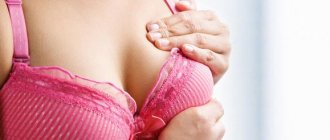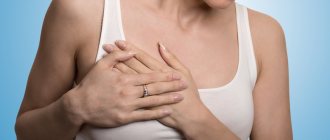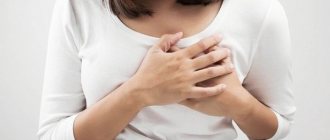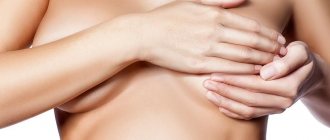Chest pain in the middle of the menstrual cycle
Breast pain is normal, but only if it occurs immediately before your period (that is, at the end of the menstrual cycle).
The thing is that during this period the amount of the hormone estrogen in a woman’s body increases, which causes discomfort in the mammary glands, as well as their swelling. Under normal conditions, the pain should go away after the onset of menstruation. If unpleasant sensations occur not at the end, but in the middle of the menstrual cycle, this should alert the woman. What could pain in the mammary glands in the middle of the cycle indicate?
PMS mastopathy injury subsequent pregnancy
The main reason for this condition is an imbalance of hormones in the body. It can be caused by the following factors: premenstrual syndrome (PMS), mastopathy, consequences of injury. It can also be the first signal that notifies a girl about pregnancy. Let's consider all the reasons in more detail.
Hormonal fluctuations
Around the middle of the cycle (12-16 days after your period), the egg leaves the ovary and enters the fallopian tube. This process is called ovulation and is accompanied by a surge of hormones. Often women do not notice this surge, but in some cases it may be accompanied by pain in the mammary glands, as well as their swelling.
ovulation occurs on days 10-16
Painful sensations are explained by the fact that the breasts are very sensitive to hormonal changes. This symptom is called cyclic mastodynia, and it goes away after ovulation.
Note: ovulation is the ideal period for fertilization. Many women, who determine the onset of ovulation by breast tenderness, seize this moment in order to have time to conceive.
PMS
Premenstrual syndrome. It does not appear in everyone, but only in some women a few days before the onset of menstruation (usually from 2 to 10 days). PMS is caused by stress, illness, childbirth, etc. It is characterized by changeable mood, endocrine disruptions and tension in the mammary glands, which can result in chest pain.
from stress and illness
Mastopathy
Mastopathy is a disease of the mammary glands, which is characterized by the growth of breast tissue, which can cause pain and secretion (fluid discharge from the nipple). As a result of the disease, lumps appear in the breast; they are benign, but they bring discomfort, and the mammary glands hurt greatly.
Mastopathy is the most common female problem and occurs in more than half of women of childbearing age. Despite the fact that the lumps caused by the disease are benign, mammologists classify such patients as at risk for developing cancer.
Types of mastopathy:
- diffuse (seals are randomly located),
- nodular (the lumps are in one place, and the chest hurts precisely in the area of the lumps),
- mixed (diffuse-nodular).
Regardless of the form, the disease requires examination by a mammologist to exclude the occurrence of oncological problems. The fact is that mastopathy can be one of the symptoms of breast cancer or develop from a benign tumor into a malignant one.
Injury
Trauma to the chest usually results in fluid and blood formations in the chest. Such formations often bring pain in the place where the blow was made or the injury occurred.
If you have a chest injury, you need an x-ray
Chest injuries require additional examination, possibly an x-ray (as prescribed by a doctor).
Inflammatory process
Inflammation in the breast is mastitis, which could be caused by an infection. Mastitis can occur after childbirth, during breastfeeding, or after an injury. It requires observation by a doctor and treatment with antibiotics.
Mastitis requires antibiotics
Pregnancy
In addition to unpleasant possible causes, breast tenderness in the middle of the cycle can be caused by pregnancy and be its first sign.
Thus, many women notice that a few weeks after fertilization their breasts become fuller and ache. If the pain does not subside after ovulation, you need to take a pregnancy test and make sure your assumptions are correct.
These are the main reasons that can lead to chest pain in the middle of the menstrual cycle. Remember that pain in the mammary glands indicates hormonal imbalances, the cause of which must be clarified with a doctor.
Why nipples hurt during pregnancy - pathological reasons
The answer to the question why nipples hurt during pregnancy will not be correct if, in addition to natural causes, we do not mention the pathological factors due to which the expectant mother is bothered by soreness in the mammary glands.
So, a pregnant woman must consult a doctor if pain in her nipples is accompanied by an increase in body temperature, the appearance of lumps in the mammary gland and pathological discharge from the nipples.
Regular discharge from the nipples is present even when the woman is absolutely healthy. The presence of this fluid prevents the ducts of the mammary glands from sticking together. The secretion is produced by the body from the moment of puberty until the age-related decline of reproductive function. The amount of natural discharge certainly increases with the onset of pregnancy. During the second trimester, the fluid inside the breasts turns into colostrum, the precursor to milk. Colostrum is a non-viscous liquid, white with a yellowish tint.
Pathological is a discharge that is bright yellow or mixed with blood from both or just one nipple. They often appear along with an increase in temperature. Such a symptom is a good reason to undergo a comprehensive examination under the supervision of a gynecologist or mammologist.
Other pathological factors that cause chest pain include:
- infection with thrush (caused by the yeast-like fungus Candida);
- symptoms of herpes on the nipples and areolas (looks like a scattering of small blisters filled with liquid);
- psoriasis (appears on the skin as pinkish spots with jagged edges);
- mastopathy due to hormonal imbalance;
- development of cancer.
Causes of pain
The mammary gland is an organ densely intertwined with blood vessels and nerves. When fluid is retained in the tissues, blood vessels and nerves are compressed - this is the reason why women’s mammary glands become hypersensitive from the middle of the cycle.
The SAC area (nipple and areolar circle) is especially rich in nerve endings. This provides erogenity to this area and makes it painfully sensitive on the eve of menstruation.
However, remember pain, especially severe pain, is not normal. Mastodynia may be a sign of developing mastopathy. PMS signals a disruption in the functioning of a woman’s hormonal system.
The reasons for increased pain may be physiological, for example, pregnancy. In this case, women often:
- nipples hurt;
- be sick;
- strong rumbling appears along the intestines;
- previously familiar and favorite smells bother you;
- taste habits change;
- menstruation does not come.
All these signs accompany pseudopregnancy. A mental disorder characteristic of women with a “fine organization” of the psyche, for whom pregnancy has become a desired but unattainable miracle. In this case, the woman needs medical help.
If your breasts are swollen and painful, your areola itches, redness and flaking appear, you notice discharge from the nipple, you may have a fungal infection. During the period of “hormone rampage”, fungal microflora actively multiplies and causes maximum discomfort.
Sensitive breasts often occur in women who choose the wrong underwear. Synthetics as a bra material and a small cup size will make any breast hypersensitive. An allergy to the material can lead to the appearance of additional symptoms simulating fungal infection (itching, swelling, hyperemia, discharge).
Various shocks have a very strong effect on the hormonal background of the female body:
- frequent flights with changes in time zones;
- lack of sleep and rest;
- incorrect use of OK;
- abortions;
- stress (physical, emotional);
- infectious diseases.
Even a trip to a resort can cause a shift in the menstrual cycle and increased symptoms of PMS. If during the beach season your breasts suddenly swell prematurely and your period begins, usually this game of hormones does not require correction.
If you had a delay, your breasts became full, your nipples hurt and itched, your taste habits changed, your lower abdomen hurt on the 19th day or shortly thereafter, and then scanty bloody vaginal discharge appeared, you may still be pregnant and experiencing implantation bleeding.
If my lower abdomen was tight and the pain was severe, my chest would hurt, and then it would stop. Period:
- started a little later;
- were more abundant than usual;
- expressed as painful;
- accompanied by heaviness in the legs;
- dizziness.
Most likely, there was a pregnancy, but the embryo was unable to implant and was rejected by your body.
The breast also becomes sensitive with the development of tumors: benign and malignant. Therefore, gynecologists and mammologists insist on regular examinations. If the sensitivity of the mammary glands has increased or any additional symptoms have appeared, there is no need to wait for the next examination date, it is better to visit a specialist immediately.
Possible diseases
Soreness of the mammary glands in the middle of the cycle, unfortunately, can be caused not only by the above-mentioned natural factors. Perhaps these are the first signs of serious pathologies.
Mammalgia
The disease is caused by insufficient progesterone and excess estrogen and prolactin.
There are two forms of mastodynia:
- Cyclic. Does not require treatment, goes away on its own with the onset of menstruation or after the end of ovulation. Symptoms: breast enlargement, aching pain, sore nipples, pain in both breasts from the middle of the cycle.
- Non-cyclical. Requires drug treatment. Symptoms: the pain is quite severe, occurs at any time, can occur in only one breast, discharge from the nipple, the breast is not enlarged.
Mastopathy
The disease is caused by tissue proliferation, the appearance of neoplasms, nodes, and cysts.
There are different forms of mastopathy:
- Diffuse. Characterized by the presence of many nodules. The pain usually appears in the middle of the cycle and can continue until the onset of menstruation. Can be treated with medication.
- Nodular, fibrocystic. Characterized by the presence of fibroids and cysts of impressive size. Pain can be observed constantly, regardless of the cycle. Surgical treatment is required.
Mastitis
Occurs when an infection enters the tissue of the mammary glands, hypothermia. An inflammatory process develops, pain appears in the chest and nipples, enlargement and swelling are observed. The skin turns red and body temperature rises.
Most often, mastitis occurs in nursing mothers. It is treated with medication or, during lactation, it goes away on its own, with the unblocking of blood vessels, due to pumping.
Neoplasms
Sometimes the reason why the mammary glands hurt in the middle of the cycle is various neoplasms in the breast tissue. Here we should distinguish between benign neoplasms and malignant tumors.
The first category includes:
- lipoma;
- papilloma;
- fibroadenoma;
- cyst.
More often, such neoplasms require surgical intervention, however, in unadvanced cases and with timely contact with a specialist, there is the possibility of drug treatment.
However, it should be remembered that if not treated in a timely manner, such a formation can develop into cancer. It is determined by palpation of the breast, or in the early stages of the disease by ultrasound. The pain may not be pronounced, begin in the middle of the cycle and end with the onset of “women’s” days.
Malignant tumor (cancer), sarcoma. The disease is similar in all symptoms to mastopathy. At a later stage of development, peeling and changes in the shape of the nipple and breast begin, as well as unpleasant discharge. The disease is also characterized by enlarged and painful lymph nodes.
Nipple discharge
Many women observe discharge from the nipples at a time when the lactation period has ended, or has not even begun. This is due to hormonal imbalance before menstruation. Estrogen and progesterone are produced in large quantities. The discharge is usually clear or white. They can't smell. They stop being released with the onset of menstruation.
If you notice constant discharge, changes in breast shape, or nipple color, consult a doctor! If you see blood, go there immediately without thinking.
Diseases characterized by the appearance of chest pain in the middle of the cycle
Pain in the chest, provided that the woman has not previously been bothered by anything like this, should cause caution. Chest pain is accompanied by diseases such as mastodynia, mastopathy, mastitis and tumors.
Mammalgia
Mastodynia occurs due to the predominance of the concentration of estrogen and prolactin throughout the entire cycle; its switch to the progesterone phase does not occur. Depending on how hormonal levels change, the disease is divided into cyclic and non-cyclic forms.
The cyclic type is characterized by the fact that pain occurs regularly in the middle of the cycle on a certain day, in both the right and left breasts, the nipples swell. In the case of the non-cyclical form, patients complain that one breast (right or left) suddenly becomes ill, it is soft, not swollen, the discharge is usually whitish, similar to colostrum. The cyclic form can go away on its own, but in the case of a non-cyclic form, the doctor usually prescribes special hormonal pills.
Mastopathy
Signs of mastopathy appear in cases where breast tissue begins to actively grow, resulting in the formation of nodules, nodules and cysts.
The breast is sensitive, the skin is not changed, rounded formations that are not fused to the skin are determined to the touch on the sides. In the early phase, the disease is treatable and responds well to prescribed hormonal therapy; in the case of an advanced process or the presence of a sufficiently large node, surgical treatment is indicated.
Mastitis
Mastitis can appear at the time of ovulation in nursing mothers whose cycle is irregular or just beginning to recover. Infectious agents and lactostasis are the main causes of the disease.
The symptoms all resemble acute purulent inflammation of the breast tissue. It is hard, increased in size, and the tactile temperature of the skin over the area of inflammation is increased. The chest feels like it’s “burning” and the pain is sharp.
However, it happens that a slight tingling sensation is also felt. These symptoms are accompanied by general changes: pain in the stomach, lower back, lower abdomen, nausea, and sometimes heaviness in the chest. Immediate consultation with a doctor will allow timely treatment to begin.
Breast tumors
The clinical picture characteristic of the development of neoplasms has always been varied. Very often, the process of tumor growth and development remains undiagnosed for quite a long time, since almost the entire initial period proceeds without pain.
The appearance of pain is a protective reaction of the body, which indicates either excessive growth of a benign neoplasm and, as a result, compression of the neurovascular bundle, or, in the case of a malignant tumor, this means that the neoplasm is growing into the underlying tissue.
Symptoms of late stage breast cancer:
- The chest hurts, in rare cases itches;
- There may be brown discharge, blood from the nipples;
- The skin seems to be welded to the formation;
- The nipple is retracted;
- An external examination reveals a violation of the correct shape of the breast;
- On palpation, a compaction is felt.
If at least one sign appears, even if the mammary gland has stopped hurting, an immediate consultation with a mammologist is necessary!
Do nipples always hurt during pregnancy?
Each pregnancy is a purely individual phenomenon, so not all pregnant women suffer from increased sensitivity and soreness of the nipples. Breast tissue will change very slowly if the following factors occur:
- decreased amount of progesterone;
- heredity;
- deficiency of vitamins and microelements due to poor nutrition.
There is nothing wrong with the fact that during pregnancy the nipples increase in size very slowly and do not cause much discomfort. If for some reason all processes in the body are slowed down, then preparing the breasts for the lactation period can begin only on the eve of childbirth or after the baby is born. However, if the expectant mother is concerned about this fact, you can talk about this topic with a gynecologist.
Pathological
Despite the fact that many women experience discharge in the middle of the cycle and the reasons for its appearance are different, do not forget that pathologies can also provoke the presence of vaginal secretions 10 days or more before menstruation. As a rule, their occurrence is often accompanied by burning and itching in the vagina, the appearance of a specific odor and pain.
Thus, cheesy discharge, depleting the sour aroma, occurs as a result of active reproduction of Candida fungi in the vagina and the development of thrush. At the same time, women often experience periods with mucus, which is caused by damage to the mucous membranes of the cervical canal due to excessive fungal activity. And after menstruation, the discharge becomes almost invisible. However, given that thrush is chronic, when the body is exposed to negative factors, after 4-5 days from the end of menstruation, curdled discharge in women appears again.
Negative factors that can provoke repeated manifestations of thrush include:
- Frequent douching.
- Climate change.
- Taking antibacterial drugs.
- Stress.
- Poor nutrition.
Discharge before menstruation, approximately 3-4 days in advance, can also occur against the background of diseases such as cervicitis and endometriosis. In the first case, light red discharge occurs due to inflammation of the cervical canal, against the background of which its small capillaries are damaged. As a result of increased estrogen production, inflammatory reactions intensify and in addition to the fact that women complain about changes in vaginal secretions a few days before menstruation, they also often receive complaints that they have:
- Pulls in the lower abdomen.
- Streaks of blood appear in the vaginal mucus (pink mucus takes on a reddish tint).
- Painful sensations intensify during sexual intercourse or after strong physical exertion.
Endometriosis is a disease in which there is a pathological growth of the uterine epithelium beyond its boundaries. And since after ovulation, the walls of the organ lose their tone and become loose, as a result of which women experience pink discharge before menstruation. At the same time, they are scanty and do not have an unpleasant odor. However, as in the previous case, the pink spot may give way to red discharge or scarlet blood, and nagging pain may periodically occur in the abdomen.
(click to enlarge)
It must be said that if a girl or woman notices creamy vaginal discharge before her period, and then has normal menstruation, this does not mean that you can postpone going to see a specialist. Endometriosis and cervicitis are characterized by frequent remissions and exacerbations, as a result of which the symptoms either subside or begin to “hit” with renewed vigor. And the longer a woman delays treatment, the worse it will be for her health.
There is another disease that causes women to develop pink spotting outside of menstruation. And this is bacterial dysbiosis. With its development, opportunistic microflora begins to predominate in the vagina, resulting in symptoms such as:
- Irritation in the intimate area.
- The appearance of an unpleasant odor.
- Swelling of the labia.
If a woman does not have her period, instead a brown or pinkish smear appears, the test is negative, and during the day there is nagging pain in the abdomen, then this may be a sign of the presence of polyps in the cervical canal. These are benign formations that can only be treated with surgery. And it is necessary to get rid of them as soon as possible, since if they are present, blood during menstruation cannot normally pass through the cervix and it begins to accumulate in the uterine cavity, provoking the development of congestion.
Scarlet discharge also occurs as a result of erosive lesions of the cervix. In this case, a woman may notice the appearance of scarlet discharge throughout her entire cycle. Moreover, they often intensify after sexual intercourse and a few days before menstruation.
In order not to torment yourself with the question of why pink or scarlet mucus appears after menstruation and what they mean, you must immediately visit a doctor and undergo a full examination. If it reveals any disturbances in the functioning of the reproductive organs, you must immediately undergo a full course of treatment. If this is not done, the consequences may be adverse.
Why do my breasts hurt before my period? Chest pain before menstruation - normal or not?
Why can breasts swell before menstruation? This reaction is explained by changes in hormonal levels and is associated with reproductive function. The following processes occur in the female body every month: immediately after the end of menstruation, the mechanism for the maturation of a new egg is launched. It then leaves the ovary and travels through the fallopian tube to the uterus. A mature egg is ready for fertilization - the period of ovulation. If fertilization does not occur, it bursts and, together with the exfoliated surface layer of the endometrium, is removed from the body, and menstruation begins. Before menstruation, the amount of progesterone increases, so the following may occur:
- irritability, nervousness, increased fatigue and other signs of PMS;
- minor pain in the lower back;
- nagging pain in the lower abdomen;
- The mammary glands swell and there is pain.
All symptoms (except for the last reaction) intensify immediately before the start of bleeding and can continue until it ends. And breast discomfort is noted much earlier: a week before menstruation (or even two). And as they approach, the symptoms subside. This is normal, since three hormones “force” breasts to swell - progesterone, estrogen and prolactin.
Enlargement of the mammary glands, tingling, pain and other unpleasant sensations are a sign of the body preparing for a possible pregnancy. That is why the breasts are the first to react to changes in the balance of hormones - during ovulation. And as the period approaches, the symptoms gradually subside, as the body “understands” that pregnancy has not occurred. If before the onset of menstruation the breasts remain enlarged, discomfort persists, this is a physiological norm. After the start of bleeding, usually all reactions fade away and do not bother you until the middle of the next cycle - that is, until the moment when the body again begins active preparation for a possible pregnancy.
Why do the mammary glands become enlarged? This is a response to changes in the concentrations of progesterone, estrogen and prolactin. Active production of these hormones is observed during ovulation. The female breast has a lobed structure; each lobe contains glandular, connective and adipose tissue. They contain milk ducts. In the first half of the menstrual cycle (the time of growth and maturation of the egg), the amount of estrogen increases, which affects adipose tissue. Its volume begins to increase - this is proliferation, a normal reaction. Then the glandular tissue changes: under the influence of progesterone and prolactin, the mammary glands prepare to produce milk. As a result, the following changes are noted:
- the chest swells and hurts;
- its sensitivity increases;
- the nipples become slightly rougher (they may protrude more clearly, become more sensitive and/or painful, and sometimes a small transparent discharge appears).
All these processes are natural, but each woman manifests herself differently. According to various sources, a strong reaction is observed in 40–60%; throughout life, its severity can change, be constant (every ovulation) or periodic. The level of discomfort is assessed from minimal, almost imperceptible, to unbearable pain.
Can breasts hurt before menstruation? Yes, this fits into the concept of “physiological norm”, but not always. If a woman has not experienced discomfort for many years, and then the first symptoms appear, then it is worth finding out the reason for such changes. If one breast hurts, but the other does not react at all, then this may also indicate certain problems. What matters is the strength and duration of the sensations, the presence of discharge and its nature, and the timeliness of the attenuation of symptoms (during menstruation). Do the mammary glands necessarily hurt? No, if they increase slightly, then such a reaction should not occur. Many women may not experience any discomfort at all due to a small monthly breast swelling.
Pathology and normality are relative concepts in medicine, each woman has her own individual reaction, so any changes in the mammary glands should be treated carefully so as not to miss the onset of diseases that can give symptoms similar to natural processes.
Why nipples hurt during pregnancy - natural causes
Gynecologists name many factors, from which the sensitivity of the female breast during gestation increases until pain appears. We will look at the reasons why expectant mothers most often suffer from discomfort in the nipple area.
Sore nipples during pregnancy - hormonal “upheaval”
After conception, the concentration of progesterone in a woman’s blood sharply increases, the main target of which, as already mentioned, is the mammary glands. Given this physiological reaction, the answer to the question of whether nipples hurt in early pregnancy and whether this is normal is obvious. The first painful sensations appear in a pregnant woman already 3 weeks after fertilization. Due to the great sensitivity of the nerve endings in the nipple area, wearing a bra during this period can become a real torment for the expectant mother.
Nipples hurt due to breast and nipple enlargement
As pregnancy progresses, the tissues and excretory ducts of the mammary glands swell and become rough. On the eve of childbirth, the size of the nipples exceeds the original size by about 2 - 3 times, and this is normal. This is how nature prepares the body for the upcoming lactation.
The pain appears due to the fact that the nerve fibers of the chest do not have time to adapt to such a rapid metamorphosis. In addition, an increase in the level of prolactin in the blood promotes the proliferation of the milk ducts, as a result of which the mammary gland becomes denser. For the same reason, the expectant mother often experiences bursting itching in the chest area. The problem is most often solved by wearing a special supportive bra with soft cups and using fatty creams with a protective function.
As you can see, the changes in the mammary glands are so specific that the symptom of sore nipples is rightly considered a sign of pregnancy.
Nipples hurt due to cracking
Nipples hurt not only at the beginning of pregnancy. This trouble can also overtake a woman in the 3rd trimester, shortly before the birth of the baby. By this time, the tissue of the mammary glands is so stretched that the surface of the areolas and nipples is sometimes covered with microtraumas, which are the source of painful discomfort. This same problem is the most common during lactation, when the baby intensively sucks on the mother’s breast.
Why does chest discomfort occur?
The severity of sensations in the middle of the cycle depends on the individual characteristics of the woman. Some representatives of the fair sex only note that the mammary gland is slightly swollen. For others, the slightest touch to the chest causes discomfort. In most cases, chest pain during ovulation is explained by natural processes occurring in the body.
Natural causes
Chest discomfort can appear not only in the middle of the cycle, but also on any other day. Experts identify several reasons that are not related to pathologies:
Changes in hormonal levels during ovulation. The mammary glands are penetrated by many blood vessels and nerve endings, which are surrounded by connective tissue. Prolactin and estrogen cause an increase in the number of glandular ducts. However, the elasticity of connective tissues does not change. The overgrown glandular tissue compresses nearby blood vessels, the outflow of fluid from all breast tissue is disrupted, slight swelling appears, and the breast increases slightly in size. In this case, the inelastic connective fibers are stretched and cause irritation of the nerve endings. Pain is most pronounced on the nipples, since they contain the largest number of nerve points.
- Inappropriate bra. Small-sized underwear puts pressure on the mammary glands, impairing blood circulation. While wearing it, a woman may not feel any discomfort, but after removing the uncomfortable bra, the blood will suddenly rush to the chest and a feeling of discomfort will appear.
- Poor nutrition. If a woman consumes a lot of salt, fluid stagnation occurs in the body. In this case, swelling appears not only in the limbs, but also in the glands.
- Stress. Anxiety affects hormonal levels. With strong nervous excitement, some hormones begin to be produced intensively, which affects the entire body.
- Taking medications. Side effects of some medications include changes in hormonal activity and disruption of water-salt balance. After stopping the use of the drugs, the discomfort disappears.
- Injury. Careless actions during physical activities sometimes lead to falls or blows to the chest area. Since the mammary glands contain nerve endings, pain occurs. The intensity and duration of discomfort depend on the force of impact on the glands.
- Pregnancy. Preparing the breast for feeding a baby begins long before birth. For most women, sensitivity and hardening of the glands occur in the first weeks after fertilization.
- The onset of menopause.
Chest discomfort as a symptom of any disease
Since breasts are part of a woman's reproductive system, changes in her condition need to be closely monitored. Sometimes discomfort indicates pathologies:
- Hormonal imbalance. The deterioration of the body's ability to produce hormones affects the condition of all organs and systems. Hormonal imbalances are accompanied by changes in the menstrual cycle and a deterioration in general well-being. Lack of hormones if not corrected in a timely manner leads to the development of infertility.
- Benign and malignant neoplasms. The cause of chest pain may be not only a tumor in the mammary gland, but also in one of the reproductive organs (uterus, ovaries, cervix).
- Nipple infection. With microtraumas accompanied by a violation of the integrity of the epidermis, infection can penetrate into the crack.
- Inflammatory processes in the body. The breast may react to infectious pathologies. With a severe cold, the composition of the blood and the amount of fluid in the tissues changes, which affects the mammary glands.
- Mastitis. In women who have given birth, active milk production begins in the first days after childbirth. If breast care is not taken care of properly, milk stagnates and infection enters the mammary glands. If treatment is not started in a timely manner, the pathology is eliminated surgically.
- Mastopathy. The disease manifests itself in the form of tightness and pain in the chest. Education is benign. In the absence of therapy, cysts and nodes grow.
- Mammalgia. It occurs as a result of a lack of female hormones.
- Osteochondrosis. Pain in diseases of the spine sometimes radiates to the chest area, so there is a feeling that the chest hurts.
Other reasons why nipples hurt during pregnancy
In some cases, the hypersensitivity of the nerve receptors of the nipples in the expectant mother is based on the following factors:
- adaptation to variable weather or climate change. Meteor dependence during gestation may manifest itself as pain in the nipple area;
- weakened immunity. A nervous situation at work and in the family, colds, chronic fatigue, and lack of sleep quickly undermine health, forcing the pregnant woman’s body to react to the problem in a completely unexpected way;
- allergic reaction to bathing products and other cosmetics, synthetic linen, household chemicals;
- side effects of drug treatment.
Causes
Hormonal changes or psycho-emotional stress are the main causes of mastodynia. In the cyclic form, discomfort occurs due to fluid retention followed by swelling of the breasts from the action of various hormones. In this case, the nerve cells are compressed, and their impulses are perceived by the brain as pain.
Indirect reasons may be:










